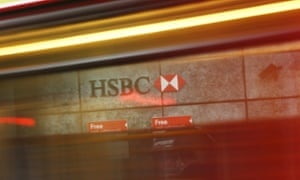
HSBC is to cut up to 25,000 jobs around the world – including as many as 8,000 in the UK – as its chief executive, Stuart Gulliver, embarks on a fresh strategy to reduce costs and bolster returns to shareholders.
Gulliver, who took the helm in 2011, has already cut the total head count to 257,000 from 296,000 but on Tuesday he signalled another wave of reductions as he turns the bank’s focus towards Asian markets.
Hundreds of branches will be closed in seven major markets including the UK, where the bank employs 48,000 in total.
Unions in Britain reacted angrily. “After all the scandals of recent years, frontline staff have suffered time and time again as they are forced to pay with the mistakes of others with their jobs, their terms and conditions and their reputation,” said Dominic Hook, Unite’s national officer for finance.
In a detailed presentation to shareholders Gulliver also set out the criteria the bank will use to decide whether to keep its headquarters in the UK, where it has been based since 1992 when it moved from Hong Kong to facilitate the takeover of Midland bank. A decision will be made by the end of the year.
The job cuts are not part of that review, which will kickstart a debate about the government’s tax policy and attitude to financial services companies – two of the 11 factors HSBC will use to determine whether to stay based in London. The UK bank levy, which costs HSBC £700m a year, will be part of HSBC’S decision and has sparked speculation that George Osborne could launch a review of the measure in his Mansion House speech on Wednesday.
Regulatory changes already under way in the UK mean that HSBC is also setting up new operations in Birmingham to be the local head office of its “ringfenced bank”. All banks must comply with rules coming into force into 2019 to have a ringfence separating their high street and investment banking business, a measure that is intended to make banks safer for customers.
Gulliver revealed that this Birmingham-based bank will employ 26,000 and use a different name to HSBC. Some 15 years ago HSBC replaced Midland’s griffin logo with its red and white hexagon brand. He repeated that it was too early to say if this business would eventually be sold off.
The strategy review – entitled “Actions to capture value from our global presence in a changed world” – involves what Gulliver is describing as a significant reshaping of the business. Operations in Turkey and Brazil will be sold although a small presence will be maintained in Brazil. These disposals will further reduce the number of employees.
The Mexican and US businesses. which Gulliver had previously described as underperforming, will be retained.
While he is overhauling the bank, he is not changing its structure as a global universal bank - one with a high street presence, major investment bank and commercial banking operations.
“HSBC has an unrivalled global position: access to high-growth markets; a diversified universal banking model with strong funding and a low risk profile; and strong internal capital generation with industry-leading dividends,” Gulliver said.
But, he said: “We recognise the world has changed and we need to change with it”.
The investment banking arm will also shrink to use less of its global balance sheet, from almost 40% to closer to 33%, in a move intended to not only bolster performance but “reduce the risk of further fines and conduct redress penalties”.
The bank said it had incurred $11.2bn of regulatory charges in the last four years, some $5.7bn of which are related to the mis-selling of payment protection insurance. The number of staff working in compliance has risen from 3,200 to 7,200.
As soon as he took the helm in 2011 after a lengthy career with HSBC, Gulliver pulled back from the bank’s strategy to be the “world’s local bank” and instead retrenched from a presence in 87 countries or territories to 73.
He also introduced motto of “courageous integrity” - the purpose of which became clearer after the bank was slapped with a £1.2bn fine the following year by authorities in the US for laundering money for Mexican drug barons. Since then it has been embroiled in the foreign exchange rigging debacle and more recently a tax avoidance scandal after the leak of account details of customers of its Swiss banking arm to the Guardian and other publications.
During a four-hour presentation, Gulliver may face questions from analysts about his plans to clean up HSBC’s operations and the scandal engulfing the world governing body of football, Fifa.
He also set out how the bank is shifting its focus to the faster-growing economies of Asia but also his view that HSBC should remain a global bank with an investment bank and retail and commercial banking operations.
“Being a global bank still delivers incredible value,” said Gulliver.
“The world is becoming increasingly connected, with Asia expected to show high growth and become the centre of global trade over the next decade,” he said.
Gulliver set out a 10-point plan for the coming years as he reshapes the business. While investment is being pulled back from developed economies, he is accelerating growth plans in the Pearl River Delta and other parts of Asia.
“We believe the world’s economy will move to the east,” said Gulliver, speaking from London.
Δεν υπάρχουν σχόλια:
Δημοσίευση σχολίου